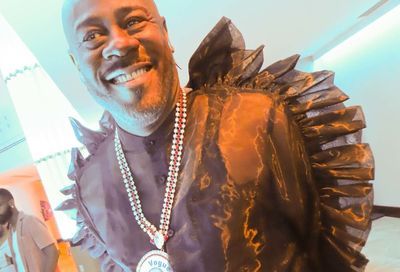Robert White, Christina Henderson, Randy Downs and Monica Palacio top GLAA candidate ratings in D.C.
More than a dozen candidates failed to respond to inquiries about their stances on LGBTQ issues
By John Riley on October 7, 2020 @JRileyMW

GLAA, the D.C.-based organization comprised of LGBTQ activists and advocates, released its final candidate ratings for the 2020 general election, with Councilmember Robert White (D-At-Large), At-Large candidates Christina Henderson, and Mónica Palacio, and Ward 2 candidate Randy Downs earning the best ratings of the pack.
The ratings were determined by candidates’ responses to a questionnaire that was based upon “Building on Victory,” GLAA’s 2020 policy brief focusing on LGBTQ-related issues and legislative priorities. The ratings, which range from -10 to 10, allow candidates to receive — or be docked — points with agreement with GLAA’s position on an issue, points for detailed answers explaining their agreement or disagreement with a particular policy, and points for their record on LGBTQ issues.
The group has also indicated that candidates who receive money from donors who are well-known anti-LGBTQ activists would have the points for their “record” reassessed. Candidates who resigned or were expelled from any elected post for ethical violations will not be awarded a rating.
The questionnaires were mailed to all candidates’ campaigns prior well in advance of GLAA’s ratings meeting, held virtually on Sept. 29, where members read over and awarded points based on their responses.
For the Council’s two At-Large seats up this cycle, incumbent Democrat Robert White and independent Christina Henderson, a former aide to retiring Councilmember David Grosso (I-At-Large), who previously held the seat, earned perfect +10 ratings for questionnaires indicating agreement with GLAA’s chief legislative priorities and substantive, in-depth responses explaining their stances.
Independent Mónica Palacio, the former head of the District’s Office of Human Rights, earned a +9.5 rating, although the organization determined “her agreement with our position [on sex work decriminalization] was too heavily caveated to consider as unequivocal support of decriminalization.”
Independent candidate Ed Lazere, the longtime director of the left-wing think tank D.C. Fiscal Policy Institute who is a favorite of progressives in the city, earned a rating of +8. Independents Mario Cristaldo and Will Merrifield, earned +6.5 and +4.5 ratings, respectively, although Cristaldo’s responses were more substantive than those submitted by Merrifield, a progressive type who works at the Washington Legal Clinic for the Homeless and has been praised by activists for innovative ideas on creating more affordable housing.
Former D.C. Councilmember Vincent Orange did not return a questionnaire, but earned a +2.5 for his past record on LGBTQ issues.
The two openly gay candidates in the 24-person At-Large race, Libertarian candidate Joe-Bishop Henchman, and independent Alex Padro, an ANC commissioner representing the Shaw neighborhood, earned +2.5 and +2, respectively. Bishop-Henchman filled out a questionnaire agreeing with GLAA’s policies, but offered “little substance,” the group noted in a news release. Padro did not return a questionnaire at all, but received “record” points for his work with the local LGBTQ community and with Shaw Main Streets.
Related: Robert White, Jordan Grossman earn perfect ratings on GLAA’s election questionnaire
A dozen remaining candidates, including Marcus Goodwin, Franklin Garcia, Calvin Gurley, Michelangelo Scruggs, Keith Silver, Jeanne Lewis, Eric Rogers, Chander Jayaraman, and A’Shia Howard, did not return questionnaires to GLAA, receiving ratings of zero. Independents Markus Batchelor and Claudia Barragan received +1, while Statehood-Green candidate Ann Wilcox received a half-point, for their known records on LGBTQ issues, although all three failed to return the questionnaire. Independent Kathy Henderson did not return a questionnaire, and was awarded a -1 for her known stances on some of GLAA’s priorities.
Republican Marya Pickering was awarded a -3 rating for a questionnaire opposing much of GLAA’s chief priorities, including opposing legislation to ban anti-LGBTQ “panic” defenses, sex work decriminalization, modernizing the city’s code to reflect gender equity, and “revising the rioting statute to better protect First Amendment expression,” according to GLAA.
In the Ward 2 Council race, independent Randy Downs, the only out LGBTQ candidate, received a +10 rating from GLAA, which included “record” points for his work in forming the ANC Rainbow Caucus, a group of LGBTQ elected officials who have used their positions to advocate on the LGBTQ community’s behalf.
Incumbent Councilmember Brooke Pinto (D), earned a +7.5 rating from GLAA for a substantive questionnaire, having amassed a pro-LGBTQ record while working for D.C. Attorney General Karl Racine, including leading legal challenges to some of the Trump administration’s anti-LGBTQ machinations.
Independent Martin Miguel Fernandez and Statehood-Green candidate Peter Bolton earned zeros, with GLAA claiming the two did not return questionnaires. However, Fernandez has since been granted an extension after he explained that he did not receive a questionnaire or a brief. His revised rating will be posted on GLAA’s website in the coming weeks.
Additionally, a spokesperson for Bolton’s campaign noted that it submitted a completed questionnaire to GLAA as early as Aug. 24, well before the September deadline for submission. It also sent Metro Weekly a copy of the questionnaire it sent to GLAA.

In other wards, where the Democratic candidate is overwhelmingly favored to win the general election, Democrats Janeese Lewis George of Ward 4, Ward 7 Councilmember Vincent Gray, and Ward 8 Councilmember Trayon White earned ratings of +6.5, +8, and +4.5, respectively, although White is not in full agreement with GLAA on all issues.
Statehood-Green Party nominee Perry Redd, running in Ward 4, did not return a questionnaire, nor did Ward 8 independent candidate Christopher Cole. Ward 8 independent Frederick Hill earned a +2.5 rating for responses, but provided little substance, and no details of any personal advocacy on behalf of the LGBTQ community. Ward 8 Republican nominee Nate Derenge was awarded a -2 for his responses, opposing almost all of GLAA’s legislative agenda.
Bobbi Elaine Strang, the president of GLAA, told Metro Weekly she was disappointed in the poor return rates, as she had hoped with a larger field of candidates — an increase that has been credited to public financing of campaigns — would increase participation. As a result, GLAA had to rely on prior knowledge, or lack thereof, of a candidates’ record to see if they could award any points.
“When candidates lost points for agreement on issues, pretty consistently the most common area of disagreement was sex work decriminalization,” Strang said, noting that laws criminalizing sex work have been used to target members of the city’s transgender community. “It’s a little disappointing that candidates did not consistently understand the importance of decriminalization, and that it is a human rights issue.”
Strang declined to speculate on whether the ongoing COVID-19 pandemic, and the decrease in in-person interactions, affected the response rate to the questionnaire.
“The things that differentiate candidates are not just agreement with our issues, but the substance of questionnaires. So, for example, if someone were to disagree with us on an issue, but could provide evidence and substance that displayed sound reasoning and facts to back up their stance, they could still get points for substance,” Strang said. “That’s the point at which candidates really start getting differentiated from one another, to a degree.”
Asked about whether GLAA’s policy priorities gives Democratic or liberal candidates more of an advantage, Strang pushed back against that contention, noting that GLAA outlines all of its priorities in the policy brief sent out along with questionnaires.
“We put out our policy paper when we sent out our questionnaire, so candidates know exactly where we stand,” she said. “It’s their choice whether they want to support the issues that we ask about.
“The Republican who dropped out of the Ward 2 race, Katherine Venice, she earned +8 for her primary rating,” Strang added. “For a Republican, it’s totally possible to get a good score from us. But it all focuses around our policy paper that goes hand-in-hand with our questionnaire. If they choose to ignore our stances, that’s on the campaign, not on us.”
Editor’s note: This story was updated to include responses from some candidates who claimed they had submitted questionnaires but were not credited with having done so.
Read more:
Trans students could be outed to their parents after Wisconsin ruling
5 LGBTQ questions HRC wants asked at the vice presidential debate
Jim Obergefell: “Marriage must not be restricted” for LGBTQ couples
Support Metro Weekly’s Journalism
These are challenging times for news organizations. And yet it’s crucial we stay active and provide vital resources and information to both our local readers and the world. So won’t you please take a moment and consider supporting Metro Weekly with a membership? For as little as $5 a month, you can help ensure Metro Weekly magazine and MetroWeekly.com remain free, viable resources as we provide the best, most diverse, culturally-resonant LGBTQ coverage in both the D.C. region and around the world. Memberships come with exclusive perks and discounts, your own personal digital delivery of each week’s magazine (and an archive), access to our Member's Lounge when it launches this fall, and exclusive members-only items like Metro Weekly Membership Mugs and Tote Bags! Check out all our membership levels here and please join us today!
The Magazine
-
Most Popular
 MISTR's Free DoxyPEP Leads to Huge Drop in STI Rates
MISTR's Free DoxyPEP Leads to Huge Drop in STI Rates  Gay Army Reserve Officer in Uniform Sex Video Scandal
Gay Army Reserve Officer in Uniform Sex Video Scandal  Signature Honors Mandy Patinkin in Emotional Celebration
Signature Honors Mandy Patinkin in Emotional Celebration  Sarah Snook is Astonishing in Broadway's 'Dorian Gray'
Sarah Snook is Astonishing in Broadway's 'Dorian Gray'  'Gray Pride' Protests Hungary's Ban on Gay Pride Marches
'Gray Pride' Protests Hungary's Ban on Gay Pride Marches  Becca Balint: The Pride of Vermont
Becca Balint: The Pride of Vermont  Jared Polis Signs Law Repealing Colorado's Gay Marriage Ban
Jared Polis Signs Law Repealing Colorado's Gay Marriage Ban  A Potent (and Pricey) 'Good Night, And Good Luck'
A Potent (and Pricey) 'Good Night, And Good Luck'  'Porn Star University' Started by Gay-for-Pay Creator Andy Lee
'Porn Star University' Started by Gay-for-Pay Creator Andy Lee  3 Million People Could Die Due to HIV Funding Cuts
3 Million People Could Die Due to HIV Funding Cuts
 Becca Balint: The Pride of Vermont
Becca Balint: The Pride of Vermont  Signature Honors Mandy Patinkin in Emotional Celebration
Signature Honors Mandy Patinkin in Emotional Celebration  MISTR's Free DoxyPEP Leads to Huge Drop in STI Rates
MISTR's Free DoxyPEP Leads to Huge Drop in STI Rates  A Potent (and Pricey) 'Good Night, And Good Luck'
A Potent (and Pricey) 'Good Night, And Good Luck'  Sarah Snook is Astonishing in Broadway's 'Dorian Gray'
Sarah Snook is Astonishing in Broadway's 'Dorian Gray'  'Gray Pride' Protests Hungary's Ban on Gay Pride Marches
'Gray Pride' Protests Hungary's Ban on Gay Pride Marches  Jared Polis Signs Law Repealing Colorado's Gay Marriage Ban
Jared Polis Signs Law Repealing Colorado's Gay Marriage Ban  White House Ignores Reporters with Pronouns in Email Signatures
White House Ignores Reporters with Pronouns in Email Signatures  White House Demands NIH Study Transgender Transition "Regret"
White House Demands NIH Study Transgender Transition "Regret"  Air Force Reverses Ban on Pronouns in Email Signatures
Air Force Reverses Ban on Pronouns in Email Signatures
Scene
Metro Weekly
Washington's LGBTQ Magazine
P.O. Box 11559
Washington, DC 20008 (202) 638-6830
About Us pageFollow Us:
· Facebook
· Twitter
· Flipboard
· YouTube
· Instagram
· RSS News | RSS SceneArchives
Copyright ©2024 Jansi LLC.









You must be logged in to post a comment.